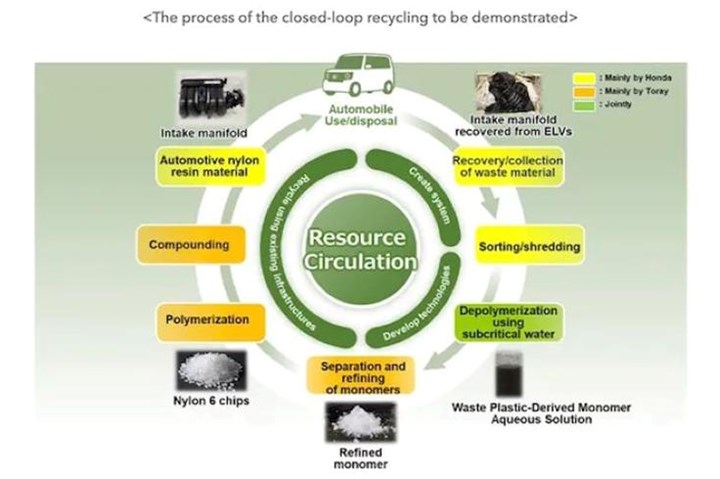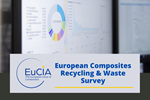Toray, Honda to jointly validate chemical nylon 6 recycling
Partners have begun verifying depolymerization and monomer separation and refining technologies using subcritical water for recovery of glass fiber-reinforced nylon 6 automotive parts, to be eventually broadened into other applications.

Framework for chemical recycling technology validation. Photo Credit: Toray Industries
Toray Industries Inc. (Tokyo, Japan) has signed an agreement with Honda Motor Co. Ltd. (Tokyo) to jointly develop a chemical recycling technology
for glass fiber-reinforced nylon 6 parts recovered from end-of-life (EOL) vehicles. Both partners have begun verifying this technology, which entails depolymerizing with subcritical water — a high-temperature, high-pressure state, just below the critical point of water (374°C, 22 megapascals) — and regeneration of the materials as caprolactam, a raw monomer.
Subcritical water is free of catalysts and is not affected by additives. Its high permeability, dissolving power and hydrolysis characteristics have been shown to successfully depolymerize resins, such as nylon 6, within several minutes, creating high yields of raw monomer. Separating, refining and repolymerizing that monomer is said to regenerate nylon 6 into a state that performs like a virgin material.
The Ministry of the Environment adopted this technology for a fiscal 2023 project to establish a decarbonized circular economy system, including validating recycling systems for plastics and other resources. Toray and Honda look to employ the project to set up a raw resin pilot facility with an annual processing capacity of 500 metric tons, which the company will use to conduct validation tests.
The first step of the project is to recycle used automotive plastic parts into the same automotive materials. The two companies plan to develop depolymerization and monomer separation and refining technologies by employing intake manifolds as raw materials for engine intake system parts. Toray and Honda seek to apply these technologies for recycling chemicals in automotive resin parts by around 2027.
Down the track, this scope will be broadened to encompass apparel, films and other non-automotive applications. Both partners also envisage inviting other companies to take part in this effort and a chemical recycling setup for nylon 6 in Japan, all to further aid in a circular economy and cut greenhouse gas emissions.
Related Content
-
Infinite Composites: Type V tanks for space, hydrogen, automotive and more
After a decade of proving its linerless, weight-saving composite tanks with NASA and more than 30 aerospace companies, this CryoSphere pioneer is scaling for growth in commercial space and sustainable transportation on Earth.
-
Thermoplastic composites: Cracking the horizontal body panel nut
Versatile sandwich panel technology solves decades-long exterior automotive challenge.
-
McLaren celebrates 10 years of the McLaren P1 hybrid hypercar
Lightweight carbon fiber construction, Formula 1-inspired aerodynamics and high-performance hybrid powertrain technologies hallmark this hybrid vehicle, serve as a springboard for new race cars.














.jpg;maxWidth=300;quality=90)

